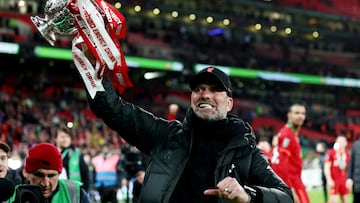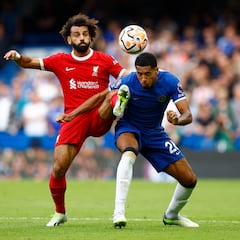Which team has won the Carabao Cup the most times in history?
After Liverpool’s 2024 Carabao Cup final win at Wembley, we take a look at the EFL Cup’s most successful club.


In this weekend’s Carabao Cup final against Chelsea, Liverpool had the chance not only to win the first piece of silverware in a potential quadruple, but also to further cement their position as the EFL Cup’s most decorated club. In the six decades since the inception of England’s secondary domestic cup competition, which was originally known as the League Cup, the Reds had lifted the trophy a record nine times. That number is now 10.
Van Dijk the hero for Liverpool
With a goalless final seemingly set for penalties at Wembley on Sunday, Virgil van Dijk headed in a 118th-minute corner to win the showpiece event for Liverpool, denying Chelsea their first major trophy since the 2020/21 season.
Liverpool stretch EFL Cup lead over Man City
In the wake of their second EFL Cup final victory over Chelsea in three years, Liverpool have moved two wins ahead of the tournament’s second-most successful club, Manchester City. In 2021, City drew level with the Merseysiders at the top of the leaderboard, when Pep Guardiola’s men clinched their fourth Carabao Cup in a row. The following year, however, Liverpool moved back in front of their Premier League rivals, thanks to a penalty shootout win over this weekend’s opposition from West London.
The five teams with the most EFL Cups
- 1. Liverpool: 10
- 2. Man City: 8
- 3. Man Utd: 6
- 4. Aston Villa: 5
- 4. Chelsea: 5
First four EFL Cups won successively
City weren’t the first team to lift a quartet of EFL Cups on the spin; that distinction also goes to Liverpool, whose first four triumphs in the competition came in consecutive seasons 40 years ago. Between 1981 and 1984, a team managed first by Bob Paisley, then by Joe Fagan, saw off West Ham United, Tottenham Hotspur, Manchester United and city rivals Everton in successive EFL Cup deciders. The run of wins, which included two replays and two extra-time victories, featured one of the tournament’s great final goals - a sumptuous curler by Ronnie Whelan to beat United in the 1983 showpiece. What’s more, the 1984 EFL Cup proved to be one third of a legendary league, European Cup and League Cup treble.
While the EFL Cup is currently sponsored by the energy drink Carabao, Liverpool’s streak of successes in the early to mid-80s coincided with the competition’s first renaming rights deal, signed with the UK’s Milk Marketing Board. The Milk Cup, as the tournament was called between 1981 and 1986, even came with a specially redesigned trophy. Over the following four decades, the EFL Cup has since also been known as the Littlewoods Cup (which had its own trophy, too), the Rumbelows Cup, the Coca-Cola Cup, the Worthington Cup, the Carling Cup and the Capital One Cup.
The ‘McManaman Final’
When Liverpool won the EFL Cup for the fifth time in their history, the tournament was halfway through its six-year deal with soft-drink giant Coca-Cola. Steve McManaman ran the show, scored both goals, and deservedly scooped the Man of the Match trophy at Wembley in 1995, as Roy Evans’ Reds beat second-division Bolton Wanderers despite Alan Thompson’s thumping second-half strike for the Trotters.
Four post-2000 EFL Cups before this season
In 2001, Liverpool again defeated second-tier opposition as they secured their sixth EFL Cup - a victory that was the first in a memorable season that brought the club another domestic and European three-trophy haul. Having beaten Birmingham on penalties, Gérard Houllier’s men then went on to thrilling final wins over Arsenal and Alavés in the FA Cup and UEFA Cup, respectively.
Two years later, Liverpool enjoyed another EFL Cup final triumph over United, beating the Red Devils 2-0 courtesy of goals by Steven Gerrard and Michael Owen. It was the final silverware in Houllier’s six-year reign as Anfield boss.
Related stories

The Carabao Cup's unwanted European place

Carabao Cup final prize money: the lowdown
Since that 2003 victory, Liverpool have had to endure a pair of decade-long waits for their eighth and ninth successes in the competition. As in 2001, they needed penalties against a lower-league side to win the EFL Cup under Kenny Dalglish in 2012, with Championship club Cardiff City beaten from 12 yards.
And 10 years on, spot-kicks decided the final in Liverpool’s favour once more, as the six-time European champions claimed the EFL Cup for the first time in Jürgen Klopp’s successful tenure on Merseyside. After a goalless draw with Chelsea, goalkeeper Caoimhín Kelleher was Liverpool’s hero in a marathon shootout at Wembley, netting what proved to be the winning penalty before his opposite number, Kepa Arrizabalaga, sent his kick over the crossbar.
Complete your personal details to comment